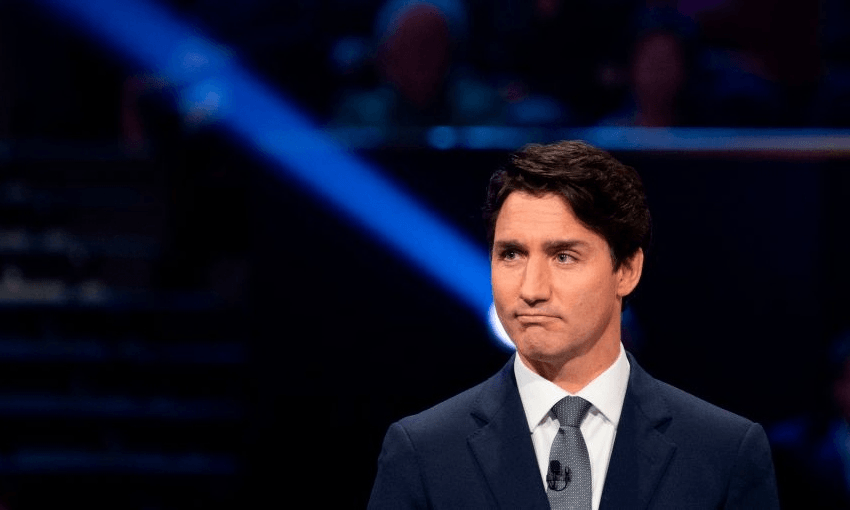After an unusually nasty campaign for their country, Canada has gone to the polls. They’ve decided that Justin Trudeau will continue as prime minister, but just like in New Zealand, he’ll have to work with coalition politics.
What’s happened?
After a brutal and at times humiliating campaign, Canadian PM Justin Trudeau has won another term. That result was called relatively early in the night. but what later emerged was a dissonant note for the Liberals, in that it would be a minority government. Now they’ll have to rely on another party to do anything. It’s a huge fall from grace for a politician who has inspired a ‘mania’ moniker.
What were the results?
In terms of the party vote, both the Liberals and the Andrew Scheer-led Conservatives were close to tied at around 33-35% each. The left-wing New Democratic Party were a long way back in third with around 15%. But none of that mattered in the way the seats were won, because Canada has a first past the post electoral system.
Under early results, the Liberals are likely to have just a shade under 160 seats, with 170 needed for a majority. The Conservatives have fallen short with around 120. In third place are the Bloc Québécois, with more than 30. And in fourth place, the New Democratic Party have around 25, but will crucially be often the first port of call for legislative support.
What now for the Conservatives?
Andrew Scheer and the Conservatives have fallen short of predictions. But they’ve also increased their vote share by about 25 seats. They’ve very much consolidated the centre-right and right wing of Canada, under an increasingly socially conservative and anti-environmental platform. They won’t like the result, but they will be happy with the trend, and another few percent in the vote could swing dozens of seats.
Does it matter that a regional party is now the third largest in the House of Commons?
Hugely. The Bloc Québécois had an excellent night, only running candidates in the Francophone province. At the current count, they have picked up huge swathes of Quebec, and more than tripled their number of seats to around 32. Many of them were taken from the NDP. The “Bloc Party” as one commentator on CBC News referred to them, are in relative terms more environmentally focused and socially liberal.
They also now control around half a state that they want to make sovereign, or even independent. Their swing shows that a huge share of Quebec’s voters are either supportive or comfortable with that, and at times the BQ will have leverage.
How has the country been divided?
In some ways it’s urban and rural. In Toronto for example, the Liberals won close to a sweep of the city, and in a few constituencies their closest rival was from the NDP. And in a more literal sense, Canada is divided right down the middle. To the West, the Conservatives and NDP dominate. And to the East, there are still a few Conservative strongholds, but largely the Liberals hold the seat-dense cities.
Were any other parties in the running?
Maxine Bernier, a disgruntled former minister with the Conservative Party, failed to win his seat on behalf of the People’s Party. Bernier is most closely analogous to politicians like Geert Wilders, Nigel Farage, or Marine Le Pen. Arguably themes of their platforms were picked up by the Conservatives, but with less aggressive messaging.
The Greens saw much improved results with climate change becoming much more central to politics in Canada, as it is in much of the rest of the world. But it only resulted in either three or four seats, and they’ll have to settle for trying to pull parliament from the outside of government.
Does Canada ever do coalitions?
Not often, and they almost certainly won’t be in this case – more like the Liberals will form confidence and supply type agreements. They won’t struggle to pass legislation that is either socially liberal or environmental, because there will almost certainly be a party willing to vote for it. But they’ll also have to concede some points to their allies. The Bloc Québécois have made it fairly clear what they want, while the NDP say they want the controversial Trans Mountain pipeline scrapped, see affordable housing be expanded and change the country’s drug buying system.
And what does it mean for Justin Trudeau?
The blackface scandal has been just one of many issues for Trudeau, coming under fire from many perspectives for the way his rhetorical persona doesn’t match how he governs. And the final share of seats is fairly disastrous, when taking into account that it is still a win.
Trudeau has always had immense international profile. But his domestic political profile has suffered badly, particularly because of a major corruption scandal, and other potential leaders will be quietly circling. For a world that has typically enjoyed looking at Trudeau, they might want to get a look in before he’s gone.





